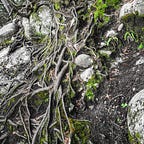I am beginning to see the connection between fear, the concept of fearing fear, and the precautionary behaviours others take to avoid it. This simple understanding appears profound only because it is right in front of our noses. We have become fascinated with defining our fears, and the myriad of forms that they take, and as a result have neglected to realize that it is the very essence of that feeling that we are attempting to escape and control. We desire to be free of the sensation of fear to such a degree that we tend to paint it with patterns of mistrust, division, reason, sense, cause, and fault. The collective goal, then, is finding a source for that fear that can be quantified, controlled, and discarded. Still, fear remains, so further methods are taken to abolish it altogether.
As we delve into the introspection of what makes us afraid, possible causes for our fears become more complex and convoluted. We create impervious walls of security only to find that we are now afraid of the confinement we have built around ourselves. We fail to acknowledge that this basic element of fear has been integrated into our organism as a survival tactic. Humans were not born with the programming to allow the casual acceptance of our inevitable non-existence. Our biological shells that have the innate ability to do such complex tasks as constructing a brain and a nervous system, something that our most brilliant scientific minds have yet to come close to mastering, was not equipped with an on-off switch for the compulsion to survive. We were hardwired with this impulsive endurance, just as we were equipped with fingernails and an appendix. Survival is the cause of our sensation of fear, and nothing we do to satisfy this will ever be enough to placate it completely; save for the chemical euphoria and momentary lapses attained from historically tried methods of escapism. These methods can be chemical substances themselves, or activities that allow for the release of our own chemical stores, like adrenaline, dopamine, or serotonin, and can mask the ever-present fear of our inevitable non-being.
We do have the ability to look at it directly, if we choose to. We can recognize fear when we have the clarity to look for it, and learn to coexist. To share a place with fear is not a comfortable undertaking, but it can bring a lasting sensation with lapses into disillusion, instead of fleeting moments of bliss amongst a sea of dread. This is not a new revelation. Some great meditations of the world have studied this, but have then become shrouded in their own dogma and mystery so that it can only be attained by their saints and sages. I do not propose a method, nor prescribe a doctrine to accomplish this task. All I can do is bring recognition to this truth of our existence, with the hope that with its awareness others may find themselves on a path of coexistence rather than finding blame.
If I have seen this truth, it is merely because I have been more intensely acquainted with failed attempts to rid myself of it; the futility of my endeavour ever bringing me back to dissatisfaction and despair. It is a process that has taken a considerable toll on every aspect of my life; my biological health, relationships, and careers have suffered great losses. It is upon exhausting the very potential of these efforts that I have found this truth can indeed be a source of freedom. This does not erase the presence of fear altogether, but it can allow one to view fear differently. No longer do I need to give it a reason for being, and so I do not look for its cause. I can give up my endless search for a cure, and find freedom in understanding it will always be present, regardless of any effort I take. I have looked at this as a ceasefire, in which my mind has been the battlefield. Now I can enjoy the regrowth of a scorched sanity from the bombardment of two indomitable forces. I know in desperate circumstances I will find blame in the things I do not trust, in the things that are different from me, in the things I can give reason to, in the things that seem to make sense, in the things of cause, and in the things at fault, but when I find I cannot continue on that path, my exhaustion and despair will give way to a profound sense of freedom once again.
